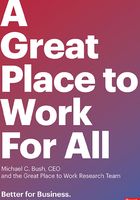
A New Frontier
But this general formula isn’t good enough anymore.
The chess game has changed, and our newest research shows that what it means to be a great workplace has evolved.
“
The new frontier in business is about improving results by developing every ounce of human potential.
”
We have entered a new era, a new frontier in business. This largely uncharted territory is about growing your business and improving results by developing every ounce of human potential within the people who work there. Our economy has evolved through agrarian, industrial, and “knowledge” phases to the point where the essential qualities of human beings—things like passion, creativity, and a willingness to work together—are the most critical. Societal and technological changes are creating new opportunities and challenges for organizations as they seek to attract the best talent and win over customers. Fast-changing competitive landscapes are putting a premium on agility and redefining what it looks like.
More people, of more diverse backgrounds, are speaking up and being heard. The massive millennial generation expects their workplaces to provide meaning, balance, and career development. Millennials also expect the brands they buy to hold the same values and will judge them harshly not just if they fail consumers but if they fail their own employees as well. Female employees, as well as those from different racial and ethnic groups, are also speaking up, sharing injustices faced in the workplace on the social media airwaves, and demanding equality.
All these changes mean companies must clear a higher bar in creating cultures that are welcoming to everyone. Our research, for example, shows that female employees who don’t feel they can have honest conversations with leaders have a lower overall workplace experience and are more likely to jump ship. On the flip side, we found that among the often-criticized group of millennial employees, those who experience their company as a great workplace are 20 times more likely to plan a long-term future there than those who do not.
The Best Companies to Work For in the United States have improved for employees over the past two decades, on average. But our data shows they are, to a great degree, still wasting human potential. They typically have pockets of people who do not feel fully alive at work and therefore are not contributing their best ideas or bringing their best selves to work.